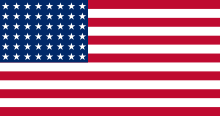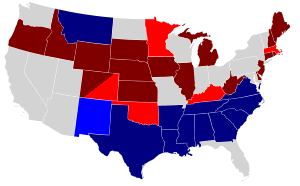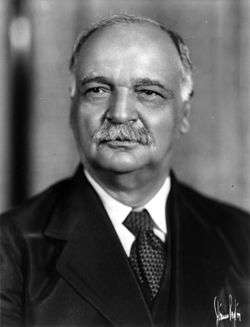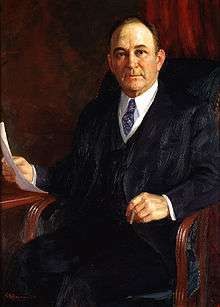United States Senate elections, 1924
United States Senate elections, 1924

|
|
|
|
|

|
| Democratic gain Democratic hold Republican hold Republican gain |
|
|
The United States Senate elections of 1924 was an election for the United States Senate which coincided with the election of Republican President Calvin Coolidge to a full term. The strong economy and Coolidge's popularity helped Republican candidates increase their majority by four, although several interim appointments had worsened their numbers since the 1922 election; as a result, the party achieved a net gain of only one seat since the previous voting cycle.
Gains and losses
The Republicans took open seats in Colorado and Oklahoma, and defeated incumbents Augustus O. Stanley (D-Kentucky), David I. Walsh (D-Massachusetts), and Magnus Johnson (FL-Minnesota), but Democrats defeated Holm O. Bursum (R-New Mexico).
Senate contests in 1924
| State |
Incumbent |
Party |
Status |
Opposing Candidates |
|---|
| Alabama |
J. Thomas Heflin |
Democratic |
Re-elected, 75.2 – 24.8 |
F. H. Lathrop (Republican) |
| Arkansas |
Joseph T. Robinson |
Democratic |
Re-elected, 73.5 – 26.5 |
Charles F. Cole (Republican) |
| Colorado |
Lawrence C. Phipps |
Republican |
Re-elected, 50.2 – 43.9 – 5.0 |
Alva B. Adams (Democratic)
Morton Alexander (Independent) |
| Colorado[2] |
Alva B. Adams |
Democratic |
Retired: Republican victory, 50.2 – 43.7 – 5.5 |
Rice W. Means (Republican)
Morrison Shafroth (Democratic)
Charles T. Phelps (Independent) |
| Connecticut[3] |
Frank B. Brandegee |
Republican |
Died: Republican victory, 60.4 – 38.6 |
Hiram Bingham III (Republican)
Hamilton Holt (Democratic) |
| Delaware |
L. Heisler Ball |
Republican |
Defeated in primary: Republican victory, 59.4 – 40.6 |
T. Coleman du Pont (Republican)
James M. Tunnell (Democratic) |
| Georgia |
William J. Harris |
Democratic |
Re-elected, unopposed |
|
| Idaho |
William E. Borah |
Republican |
Re-elected, 79.5 – 20.1 |
Frank Martin (Democratic) |
| Illinois |
Medill McCormick |
Republican |
Defeated in primary: Republican victory, 63.5 – 35.4 |
Charles S. Deneen (Republican)
Albert A. Sprague (Democratic) |
| Iowa[4] |
Smith W. Brookhart |
Republican |
Re-elected, 50.0 – 50.0 |
Daniel F. Steck (Democratic) |
| Kansas |
Arthur Capper |
Republican |
Re-elected, 70.1 – 25.2 |
James Malone (Democratic) |
| Kentucky |
Augustus O. Stanley |
Democratic |
Defeated, 51.6 – 48.4 |
Frederic M. Sackett (Republican) |
| Louisiana |
Joseph E. Ransdell |
Democratic |
Re-elected, unopposed |
|
| Maine |
Bert M. Fernald |
Republican |
Re-elected, 60.4 – 28.2 |
Fulton J. Redman (Democratic) |
| Massachusetts |
David I. Walsh |
Democratic |
Defeated, 50.3 – 48.6 |
Frederick H. Gillett (Republican) |
| Michigan |
James Couzens |
Republican |
Re-elected, 74.3 – 24.6 |
Mortimer E. Cooley (Democratic) |
| Minnesota |
Magnus Johnson |
Farmer–Labor |
Defeated, 46.5 – 45.5 – 6.4 |
Thomas D. Schall (Republican)
John J. Farrell (Democratic) |
| Mississippi |
Pat Harrison |
Democratic |
Re-elected, unopposed |
|
| Montana |
Thomas J. Walsh |
Democratic |
Re-elected, 52.8 – 42.4 |
Frank B. Linderman (Republican) |
| Nebraska |
George W. Norris |
Republican |
Re-elected, 62.4 – 37.6 |
J. J. Thomas (Democratic) |
| New Hampshire |
Henry W. Keyes |
Republican |
Re-elected, 59.8 – 40.2 |
George E. Farrand (Democratic) |
| New Jersey |
Walter E. Edge |
Republican |
Re-elected, 61.8 – 33.7 |
Frederick W. Donnelly (Democratic) |
| New Mexico |
Holm O. Bursum |
Republican |
Defeated, 49.9 – 47.4 |
Sam G. Bratton (Democratic) |
| North Carolina |
Furnifold M. Simmons |
Democratic |
Re-elected, 61.6 – 38.5 |
A. A. Whitener (Republican) |
| Oklahoma |
Robert L. Owen |
Democratic |
Retired: Republican victory, 61.6 – 35.4 |
William B. Pine (Republican)
John C. Walton (Democratic) |
| Oregon |
Charles L. McNary |
Republican |
Re-elected, 66.0 – 24.7 – 7.7 |
Milton A. Miller (Democratic)
F. E. Coulter (Progressive) |
| Rhode Island |
Jesse H. Metcalf |
Republican |
Re-elected, 57.6 – 41.8 |
William S. Flynn (Democratic) |
| South Carolina |
Nathaniel B. Dial |
Democratic |
Defeated in primary: Democratic victory, unopposed |
Coleman L. Blease (Democratic) |
| South Dakota |
Thomas Sterling |
Republican |
Defeated in primary: Republican victory, 45.4 – 33.1 – 12.1 – 7.2 |
William H. McMaster (Republican)
U. S. G. Cherry (Democratic)
Tom Ayres (Farmer–Labor)
George Egan (Independent) |
| Tennessee |
John K. Shields |
Democratic |
Defeated in primary: Democratic victory, 57.3 – 42.6 |
Lawrence D. Tyson (Democratic)
H. B. Lindsay (Republican) |
| Texas |
Morris Sheppard |
Democratic |
Re-elected, 85.4 – 14.6 |
T. M. Kennerly (Republican) |
| Virginia |
Carter Glass |
Democratic |
Re-elected, 73.1 – 24.2 |
W. N. Noak (Republican) |
| West Virginia |
Davis Elkins |
Republican |
Retired: Republican victory, 50.9 – 47.7 |
Guy D. Goff (Republican)
William E. Chilton (Democratic) |
| Wyoming |
Francis E. Warren |
Republican |
Incumbent re-elected in 1924, 55.2 – 44.8 |
Robert R. Rose (Democratic)
|
Senate composition before and after elections
See also
References
- ↑ September 8, 1924 in Maine
- ↑ special election held due to death of Samuel D. Nicholson (R-CO). Interim Senator Alva B. Adams (D-CO) unsuccessfully ran for the other Senate seat.
- ↑ special election held due to death of Frank B. Brandegee (R-CT)
- ↑ Steck contested the election, and although Brookhart was initially seated in the Senate, eventually he was unseated in favor of Steck. This is the only time a Senate election has been overturned after one candidate had already been seated.


